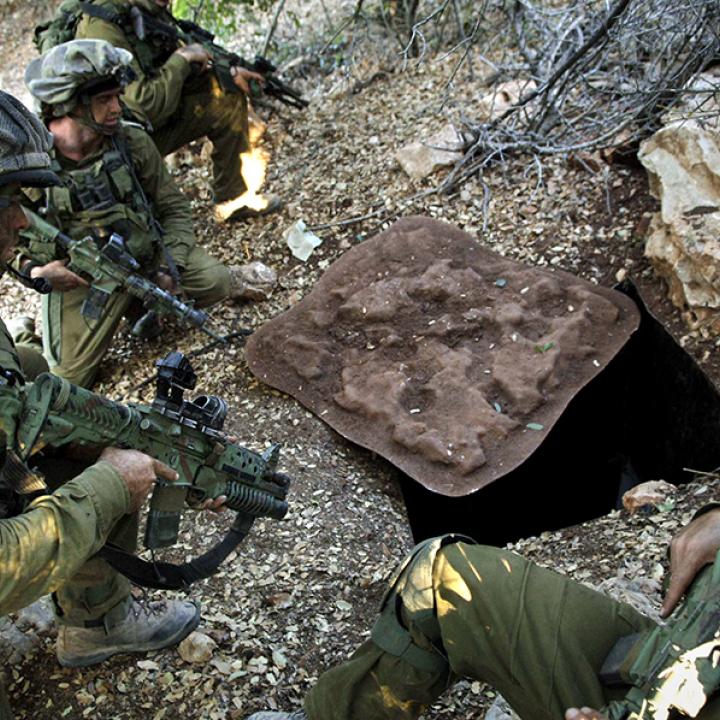
- Policy Analysis
- Policy Alert
Prominent Saudi Columnist Notes Arab Support for Israeli Strike on Hezbollah

Greater Sunni acceptance of Israel as a regional power, however grudging and conditional, may give Washington more room to pursue longstanding peace goals.
On January 20, writing in the widely read London-based Arabic daily al-Sharq al-Awsat, veteran media figure Abdulrahman al-Rashed asked rhetorically why Arabs were applauding the previous day's airstrike on a Hezbollah convoy on the Syrian side of the Golan Heights, an attack widely attributed to Israel (read his op-ed in English or Arabic). The strike reportedly killed Jihad Mughniyah and a number of other senior Hezbollah commanders, as well as Gen. Muhammad Ali Allah-Dadi of Iran's Islamic Revolutionary Guard Corps.
Rashed wrote, "In my opinion there's no doubt that if a confrontation occurs between Israel and Hezbollah, or between Israel and Iran, many Arabs will pray for the defeat of Hezbollah's militias and the generals of its Iranian ally." He noted that many Arabs were cheering the strike on social media and in personal comments. To explain such sentiment, he noted that while Arab public opinion a decade ago viewed Hezbollah as a defender of Arab interests in Lebanon and Palestine, the group's Iranian-supported intervention in the Syrian civil war turned many against it and led to a new appreciation of Israeli military action against Hezbollah and Iranian personnel.
To be sure, Rashed stated clearly that this new attitude does not mean Arabs have come to love Israel, but rather that they are changing their view of the region based on the age-old concept "the enemy of my enemy is my friend." Deeper Arab acceptance of Israel will need to wait for a peace deal with the Palestinians, he argued, but in the meantime Arabs could accept a tacit alliance with Israel in the event of a regional war with Iran.
The article is noteworthy because it indicates that well-established security cooperation between Sunni Muslim governments and Israel -- which has developed steadily though largely in secret since the "Arab Spring" -- is now moving into the arena of public discourse in the Arab world. And while Rashed is correct that the failure to achieve an Israeli-Palestinian peace agreement remains a barrier to popular Arab acceptance, his point about newfound appreciation of Israeli military might as a counter to Iran underscores important shifts in regional alignments.
In particular, the once-tacit notion that Sunni states share a vital interest in Israel's opposition to Shiite Iranian hegemony seems to be emerging from the domain of military and security services into the light of Arab public debate. Fear of violence and chaos spreading from Syria, Libya, Yemen, and Iraq is combining with fear of an aggressive Iran to cast Israel in a new light. Of course, the Egyptian, Jordanian, Saudi, and Emirati publics lag well behind their political and security leaders when it comes to recognizing and exploring common security interests with Israel. Mistrust and fear of Israel runs deep in these societies, and support for Palestinian aspirations remains a major common denominator in their discourse. But Rashed's analysis, and the fact that he published it openly in one of the leading Arabic newspapers, may offer new opportunities for U.S. policy.
Some will argue that his article is based on an implicit rebuke of the United States -- many Sunni Arabs have criticized Washington for its perceived overeagerness to normalize relations with Iran at their expense, and for its unwillingness to intervene in Syria to stop the mass slaughter there. Yet greater Sunni acceptance of Israel as a regional power, however grudging and conditional, points to the possibility of achieving a longstanding U.S. goal: Arab acceptance of their Israeli neighbor in the context of a regional peace settlement. To be sure, this trend can only go so far in the absence of Israeli-Palestinian negotiations, and deft U.S. diplomacy will be needed to address Sunni and Israeli concerns about a possible deal with Iran. Nevertheless, those looking for a glimmer of hope in recent news from the Middle East can take heart in Rashed's article.
Marc Sievers is the Diplomat-in-Residence at The Washington Institute and former U.S. deputy chief of mission and charge d'affaires in Cairo. The views in this article are his own and do not necessarily reflect the views of the U.S. Department of State or the U.S. government.

